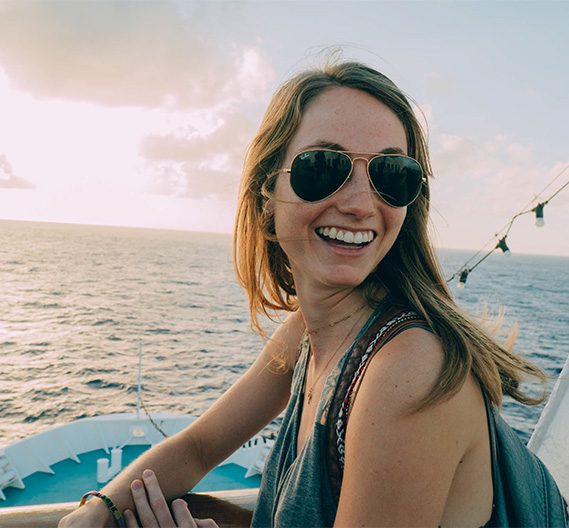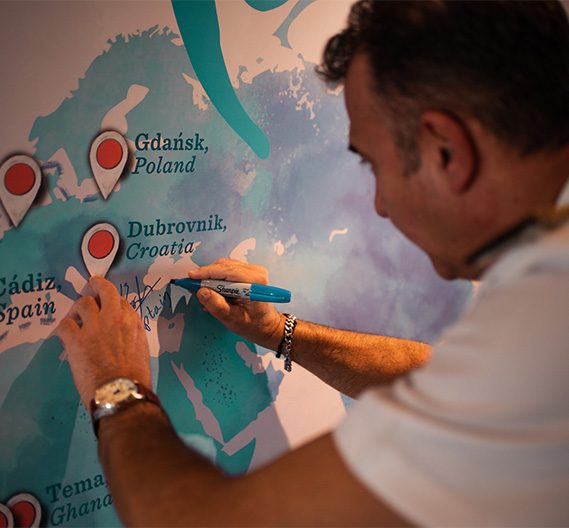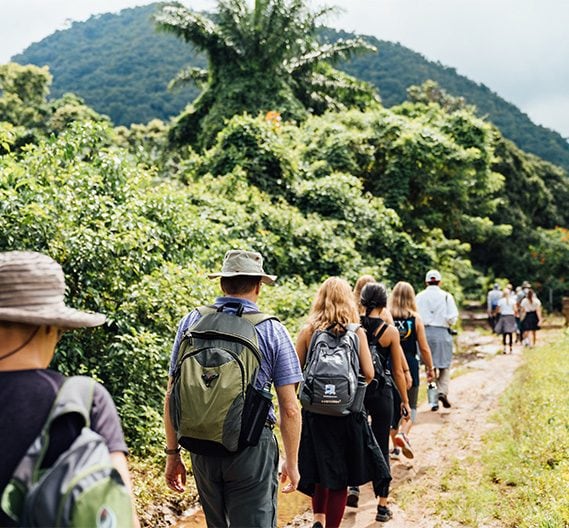The Captain and Officers have access to state-of-the-art communication tools including but not limited to satellite telephones, Internet, and robust weather forecasting systems that assist with planning and risk mitigation.
Safety
How We Stay Safe
Our risk management approach keeps our voyages on the cutting edge of safe travel and study abroad experiences.

Right People, Right Place, Right Time
Effectively managing and mitigating risk requires partnerships with each individual onboard and starts well before each voyage begins. Semester at Sea understands there is an inherent risk in international travel — and any worthwhile endeavor! Awareness of these risks is the first step in mitigating and managing them. We take this responsibility seriously and place great emphasis on preventative measures, training and education, and key partnerships.
Smart Itinerary Planning
Our operations team at ISE works closely with Cruise Management International (CMI), the MV World Odyssey ship management company, and the Captain to plan itineraries that meet Semester at Sea’s programmatic mission while prioritizing voyager health and safety and operational considerations such as weather and ocean current patterns, refueling, provisioning, responsible disposal of waste, and back-up contingency port options. Smart itinerary planning from the start increases the likelihood that voyages can be completed as originally designed.


Ship Design, Maintenance, and Compliance
Voyagers travel aboard the MV World Odyssey, a ship held to the highest international standards for ocean travel. The MV World Odyssey meets the International Maritime Organization’s SOLAS (Safety of Life at Sea) requirements, including those for lifeboats, rescue boats, and life jackets for every person on board.
Semester at Sea partners with several entities that are experts in ship-based travel. These partners oversee all policies, regulations, inspections, training, international regulatory compliance, and general vessel operations. The MV World Odyssey is required to be in complete compliance with the International Maritime Organization, the Maritime Labor Convention, and all flag-state and insurance provider requirements. These governing bodies oversee items such as the vessel’s routine maintenance inspection and equipment replacement schedules; crew regulation and hiring and training; expectations for personal protection equipment; and adherence to regulations around the type of fuel used, environmentally-responsible disposal of waste, etc.
Additionally, the MV World Odyssey is required to be in compliance with all port state control health inspection regulations and requirements prior to arrival in each country. Port state control is the inspection of foreign ships in national ports to verify that the condition of the ship and its equipment complies with the requirements of international conventions and that the ship is manned and operated in compliance with these rules.
Communication Tools
Medical Evaluation and Support
All voyagers are required to pass a comprehensive medical evaluation prior to the voyage and agree to the code of conduct and voyager’s handbook policies. Once onboard, voyagers participate in an intensive program orientation where they are briefed on the important role they play in helping to create a safe voyage, among other key programmatic elements.
Voyagers are held accountable for adhering to all policies outlined in the Voyager’s Handbook. Every person has a role to play in helping to create a safe voyage experience. Violations of policies are taken very seriously and can result in expulsion from the program.

Medical Travel Insurance
Semester at Sea partners with Cultural Insurance Services International (CISI) to provide robust medical support services no matter where the ship is in the world. Through our partnership with CISI, Semester at Sea has access to worldwide medical resources, expert medical advice, world-class security and intelligence briefings, and evacuation coordination and emergency response support 24/7. All voyagers are automatically enrolled in this plan at no extra cost. Semester at Sea pays for coverage from embarkation to disembarkation. Voyagers choosing to continue traveling outside their home country after disembarkation are encouraged to purchase a separate travel insurance policy.
Policy exclusions: Voyagers are encouraged to read the full policy and consider purchasing additional coverage for items not included such as trip interruption/cancellation if desired. Make note of policy exclusions, specifically the high-risk activities of mountaineering, hang gliding, parachuting/skydiving, parasailing, bungee jumping, or racing by horse or motor vehicle/motorcycle. Accidents and injuries caused by these activities are not covered and therefore emergency medical care and repatriation home will not be available through this policy should voyagers make the poor decision to engage in these activities. (This is also considered a violation of program policy.)
This policy provides travel insurance benefits for individuals traveling outside of their home country. This policy does not constitute comprehensive health insurance coverage (often referred to as “major medical coverage”) and does not satisfy a U.S. citizen’s individual obligation to secure the requirement of minimum essential coverage under the Affordable Care Act (ACA). Voyagers should not cancel any existing major medical coverage.
Emergency Response Preparedness
ISE has a critical incident response plan in place that calls into action the various resources within the Institute and partners. Some key partners and resources include, but are not limited to:
- All U.S. passport holders are automatically enrolled in the U.S. State Department’s Safe Traveler Enrollment Program (STEP). (Voyagers of other nationalities are encouraged to sign up for similar programs from their home countries.)
- Through our contract with CISI (Cultural Insurance Services International), Semester at Sea compiles medical infrastructure reports for each country prior to the start of each voyage. These reports provide lists of preferred medical facilities that ensure they have been vetted by their local representatives to provide quality and reliable care.
- CISI’s contracted security partner, WorldAware, provides private intelligence and security briefings to Semester at Sea and offers 24/7 assistance should a security-related issue arise.
- In the event of an incident on board, we have established contacts and response protocols utilizing a coordinated international network of Maritime Rescue/Joint Rescue Command Centers in all coastal countries around the world. This international network responds to any urgent need or emergency encountered while at sea (medical, safety, or vessel-related) by Coast Guard or naval ship, helicopter, or other designated vessel.
- Pre-established relationships with U.S. Embassies in each country provide assistance and support for consular, diplomatic, or emergency needs.
- Contact information for U.S. Embassies, local emergency numbers, and preferred medical facilities are provided to all voyagers on the “green sheet” (printed handout given to all voyagers and distributed digitally).

Evaluation, Feedback, & Reporting
An open feedback loop is an important part of mitigating future risks. All voyagers are encouraged to submit incident reports for anything of concern both on the ship and in port (accessible via the ship’s intranet and online.) The Semester at Sea health, safety, and security strategies are continuously evaluated in consultation with key partners. Improvements are made regularly to adapt to the changing needs of our program. After major incidents, a post-crisis review is conducted to determine ways in which the incident might have been avoided or better managed.
Semester at Sea submits crime statistics to Colorado State University to be included in their annual campus security report.
Our international shipboard campus, the MV World Odyssey, is subject to the health and safety provisions of SOLAS (International Convention for Safety of Life at Sea) and the Cruise Vessel Security and Safety Act of 2010. For example, the Captain must report certain types of crimes directly to the Federal Bureau of Investigation as well as other reporting bodies.
Notice of Captain’s Duty to Report
The MV World Odyssey must comply with the U.S. Cruise Vessel Security Act of 2010. This act addresses the following:
On international voyages that embark or disembark in the United States, or on those voyages where an incident takes place on high seas or in foreign waters if the assailant or victim is a U.S. national, the Captain is required to report onboard serious felonies, including homicide, suspicious death, kidnapping, assault with serious bodily injury, sexual assaults as defined by federal laws, firing or tampering with the vessel, or theft of money or property in excess of $10,000 as well as missing U.S. nationals to the F.B.I. by telephone as soon as possible, to the U.S. Department of Homeland Security electronically, and to the U.S. Coast Guard in writing. The F.B.I. can assert criminal jurisdiction in all of these circumstances. Each of the nations visited, as well as the vessel’s nation of registry, may also assert jurisdiction and/or impose additional reporting requirements.
Participants are reminded (at orientation, by routine communication channels, and in the health, safety, and security binder found in each cabin) to immediately report any missing person, injuries, or possibly unsafe or illegal behavior to the Reception Desk. Additionally, medical emergencies and requests for medical assistance should also be reported immediately to the Reception Desk, which functions like a 911 call in these circumstances. Participants’ cooperation in reporting unsafe or possibly illegal behavior is of great assistance to the security staff and/or medical personnel in responding to the situation in an efficient manner.
In-Country Travel Planning & Resources
Time spent in-country presents more risk and variables outside our control than the time spent at sea. As a result, Semester at Sea devotes many resources to helping voyagers plan and prepare for their time in port. Prior to embarkation voyagers are provided an “in-country planning guide” (see example) and are encouraged to come to the ship with a rough plan for each country. Once on board, students are encouraged to connect with like-minded travel buddies. These connections are supported by Student Life programming and student organizations.


Knowledge is Power!
Prior to arrival in each country, ISE administrators consolidate all updated health, safety, and security briefings and recommendations obtained from various resources including but not limited to: U.S. State Department, WHO, CDC, Cultural Insurance Services International (CISI), and their contracted intelligence and medical partners. This “just-in-time” updated information is provided to the Voyage Leadership Team to share with the shipboard community. Information is shared in presentation format during a mandatory “Pre-Port” meeting, and key information is provided in writing on the “green sheet” (emergency contact information, key reminders, logistical information about the ship’s location, etc.) These mandatory community-wide meetings provide voyagers with specific details about the health, safety, and security risks and any specific Semester at Sea policies or expectations related to the upcoming destination. Voyagers are expected to attend, but if for some reason they are unable to attend, arrangements will be made for them to watch the presentation before disembarking in port.
Empowering Participants
While Semester at Sea does everything we can to reduce and mitigate risk, we cannot completely eliminate or avoid all potential risks. Each participant and their family are encouraged to do their own research and come to their own conclusions about their comfort level with the various risks inherent to international and ship-based travel. Emergency medical evacuations are available in all ports of call; however, in more remote areas of any country, medical attention and evacuations may be unavailable or not close by. The quality of medical care and emergency response transport may not be at the same standard as in your home country. Additionally, in remote areas of any country, cell phone service and Internet may be inconsistent or unavailable. Semester at Sea provides information about medical capabilities in each country within the voyager portal accessible during the preparatory phase. While on the ship, health and safety information can also be accessed through the ship’s intranet, “Homeport.”
